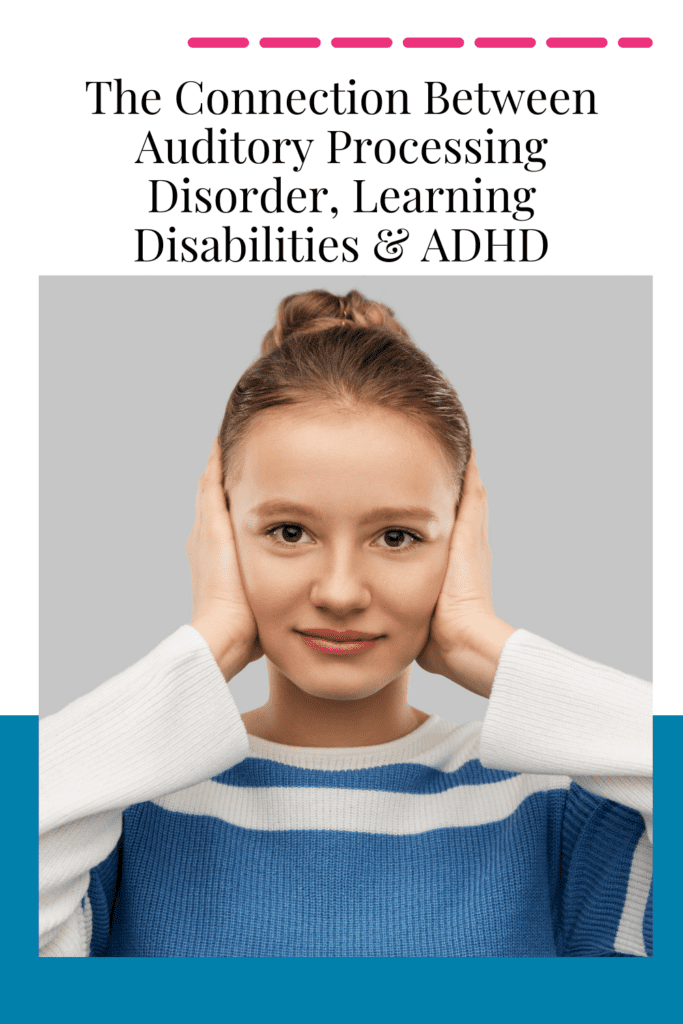My mother has a wooden plaque hanging in her kitchen since my childhood. It says, “If you don’t want your children to hear what you’re saying, pretend you are talking to them.”
Children not listening is one of the most common complaints of parents and teachers and also has been the inspiration of countless parenting jokes.
But what about if your child’s difficulties with listening goes much further than the regular parent-child battles?
Does this sound like your child?
Maybe you have noticed that your child has a hard time processing instructions, has difficulty paying attention, remembering information or even filtering out background noise.
… or maybe your child has received an official diagnosis of auditory processing disorder or ADHD, SPD and the pscyho-ed evaluation found there are areas of breakdown with the auditory processing that is contributing to your child’s reading, learning or behaviour issues.
Auditory processing disorder occurs in 20% of kids with learning disabilities and behaviour issues and 50% of children with ADHD.
Understanding Where Learning and Attention Breakdown Occurs in the Brain
So, let’s start by understanding auditory processing disorder – and why the auditory systems impacts learning and attention so much.
Auditory Processing Disorder (or difficulties) is when there is a disconnect between what the ear hears and what the brain processes. It is not a hearing a problem and cannot be diagnosed with a standard hearing test.
The breakdown with the auditory system is in receiving, processing, interpreting, retaining and even communicating auditory information.
The Ear is Just the Beginning: The Difference Between Hearing & Listening
The ear has a much more profound effect on learning and attention than we realise.
The first aspect to understand is the difference between hearing and listening.
Hearing is passive. We don’t have to do anything with the information – it just happens.
Listening is an active process that requires engagement. If a child is listening to information they will likely learn. Just because they are hearing information does not mean they are actually processing or that their brain is doing anything with the information.
When a child’s ability to ‘listen’ is compromised then so too is their ability to learn, memorize, pay attention, and even acquire language or communicate.
Why Good Auditory Processing is Crucial for Higher Order Brain Skills
Sound travels through the ear and goes into the body via the nervous system. This occurs via the vagus nerve which is a nerve that runs from the brain stem to the ears and to several organs in the body.
Think of the ear as a portal to the brain that acts as a ‘processing plant’. It converts sound waves into electrical waves which provide stimulation to the higher brain known as the cortex.
The cortex is where that oh so important executive functioning occurs: the planning, organizing, impulse control, reasoning, working memory, emotional regulation, attention, motivation and so much more.
The Path to Better Executive Functioning Starts with Auditory Processing
When you consider (or maybe you already know) how much executive functioning influences, you can see why the stimulation of this nerve via the auditory system will impact your child’s energy level, their ability to process information and their brain organization.
As you likely know the ear is tied to the vestibular system which is why APD also affects movement and balance. There is a direct connection between the vestibular system and how it affects attention, motor coordination, and even language and communication.
The Sound Barrier that Might Be ‘Broken’ in Your Child
You might be wondering how it is that the ear can affect your child’s ability to focus or learn.
Let’s start by going deeper into the ear known as the ‘middle ear’ where you will find the tiniest muscles and bones in the entire body. They are called the hammer, anvil and the stapes.
These guys are responsible for helping your child to be able to tune out back ground noise which are higher frequency and being able to focus on things like when the teacher is talking (which is lower frequency), rather the kid whispering behind them, the hum of a fan or the racket in the classroom next door.
Why Your Child Has a Hard Time Filtering Distractions and Accurately Processing Information
If there is dysfunction with these parts of the ear, a whole host of problems will arise. Any parent with a child who has Sensory Processing Disorder, ADHD, ASD knows how these kids can become distracted or even completely overloaded from simple sounds like the hum of the cars outside.
The reason that there are so many difficulties related to learning is because while the ear is hearing the incoming sound, the brain is having a difficult time accurately processing the auditory stimulus that is coming through the auditory nerve.
Where the ‘Phone Wires’ Get Crossed
The goal of the auditory nerve is to carry that information to the cortex – where executive functioning occurs. It’s around this point that the auditory information is converted in the cortex to language processing.
When there is Breakdown on Your Child’s Information Highway
The simplest way to think about it is that as the auditory information travels on its way to the cortex, there are problems on the highway which is the auditory nerve. Information becomes misinterpreted, mixed up or not processed at all during its journey so that by the time it reaches the language centre – it’s no longer the same ‘information’.
Whether it’s a case where your child can’t seem to tune out background noise, filter distractions, has poor focus or has difficulty learning because their brain isn’t processing messages correctly, auditory processing issues is often a major culprit.
Addressing the root cause of poor auditory processing MUST form the basis of any protocol that is actually going to help your child overcome their challenges with learning and behaviour.
In order to understand how to move beyond auditory processing issues and even improve or correct them, it is helpful to know what type of auditory processing breakdown your child has – which I will be talking about next time.
Want to learn more about you can help your child overcome auditory processing disorder challenges? Schedule a free Better Brains Breakthrough session.


